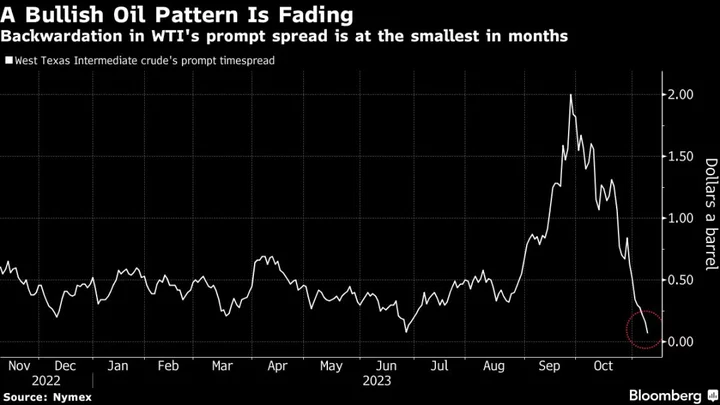Oil extended declines as traders digested multiple indicators of weakening demand and braced for more clues from Federal Reserve officials on the path for interest rates.
Global benchmark Brent dropped more than 2% on an intraday basis on Wednesday, briefly dipping below $80 a barrel for the first time since July, before rebounding. US benchmark West Texas Intermediate declined as much as 2.5% to below $76 a barrel, following a 4.3% decline on Tuesday.
As the risk premium from the Israel-Hamas has faded in recent weeks, traders’ focus has shifted to demand, which has shown signs of softening. In China — the world’s biggest crude importer — refining margins are shrinking, oil and fuel stockpiles are swelling and air travel still has yet to rebound sharply. In the wider economy, business and consumer confidence remain low despite government efforts to juice growth.
Economic data from China “further soured the mood and contributed to yesterday’s sharp falls,” said Craig Erlam, senior market analyst at Oanda. “The focus is clearly shifting from undersupply to weak demand, and central banks insisting that rates must remain high could further exacerbate that.”
Read More: China’s Oil Demand Outlook Is Worsening as Winter Approaches
In the US, government data indicate that American gasoline demand will fall to a 20-year low next year on a per-capita basis, with prices at the pump and inflation likely reducing discretionary driving. On the supply front, Russian shipments are running near a four-month high, while industry data showed US crude stockpiles increased by almost 12 million barrels last week.
Meanwhile, Fed Chair Jerome Powell is leading a raft of US central bankers speaking at a conference in Washington on Wednesday, potentially providing signals on the path for interest rates.
The growing bearishness is also being reflected in the futures curve, where the premium for near-term barrels has all but vanished. The price difference between WTI’s two nearest contracts briefly collapsed to parity on Wednesday. That compares with a bullish backwardation structure of more than $1.75 last month.
Crude inventories at the key hub in Cushing, Oklahoma, increased by 1.1 million barrels last week, the industry-funded American Petroleum Institute reported Tuesday, according to people familiar. That would be the biggest increase since June if confirmed. The Energy Information Administration won’t publish official data on Wednesday, releasing two weeks’ worth on Nov. 15.
However, OPEC+ said it was still positive on the demand outlook as it prepares for its next ministerial meeting. Saudi Arabia and Russia may decide whether to extend voluntary supply cuts into 2024 at the gathering in the final weekend of November.

